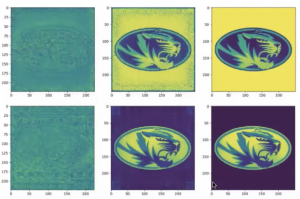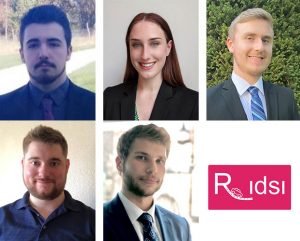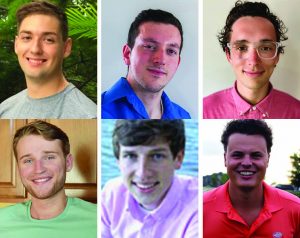
May 26, 2021
Mizzou Engineers Develop Algorithms to Organize Streaming Data
Mizzou Engineers have written new algorithms to better organize, or “cluster,” streaming data. The work has the potential to help businesses better use information coming in constantly or medical providers best respond to ongoing health changes. The goal of clustering is to find meaningful structure within a set of data. But the rise of continuous information generated from sensors, the internet or other sources make it tough to rely on traditional clustering processes to understand the data. “The data comes in — like clicks on the internet — and it’s not like you can collect a billion points and…

May 25, 2021
Using AI to Generate Holograms in Everyday Settings
Visualization of the optimized phase delays, the output of the model and the ideal output of holograms. Imagine being able to see a hologram of the person you’re talking to on your cell phone. Sound futuristic? Mizzou Engineers are finding ways to someday make that a reality. A research team is studying how artificial intelligence (AI) can help generate holograms in everyday settings. Marshall Lindsay, a PhD student in computer science, presented the work at an international conference hosted by SPIE, the Society of Photo-optical Instrumentation Engineers. Unlike traditional holograms, which are made by using laser beams to illuminate an object…

May 21, 2021
Mizzou Engineer Receives IEEE IMS Graduate Fellowship
Omiya Hassan was one of three recipients from around the globe to receive a Graduate Fellowship Award from the Institute of Electrical and Electronics Engineers Instrumentation & Measurement Society (IMS).

May 19, 2021
Gubera to Screen Joplin Documentary on 10th Anniversary of Tornado
A Mizzou Engineering faculty member will screen his documentary, “Joplin, Missouri: A Tornado Story” this weekend on the 10th anniversary of the storm.

May 11, 2021
Improving health by improving water filtration
A research team led by Mizzou Engineers recently published an article on how to potentially remove arsenic from ground water more efficiently with less expense for household use.

May 11, 2021
Mizzou Cybersecurity Center Board Provides Industry Expertise
A new Mizzou Cybersecurity Center Industrial Advisory Board (IAB) is helping the college enhance curriculum and research to best meet emerging needs within cybersecurity fields.

May 7, 2021
Meet Prasad Calyam
The U.S. is facing a severe shortage of cybersecurity professionals, leaving government and businesses vulnerable to online attacks. A Mizzou Engineer is on a mission to fill those vacancies. Meet Prasad Calyam, who has made it his purpose to train a new generation of cyber warriors who can defend our digital data. Calyam is an associate professor and Robert H. Buescher Faculty Fellow in the Electrical Engineering and Computer Science (EECS) Department. He is director of the Mizzou CERI Center for Cyber Education, Research and Infrastructure and co-director of the Cybersecurity Center. He’s a sought-after expert often invited to share his insights on cybersecurity and…

May 6, 2021
Computer Science Students Create RIDSI Website to Help Track Traffic
State officials and emergency workers in Missouri will have an easier way to view traffic data in the future, thanks to a Mizzou Engineering collaboration. For their senior capstone project, computer science students created a website and mobile app that provide a central source for real-time and historical transportation information.

May 5, 2021
Machines Can Explain Decisions Through Images, Researchers Find
Machines have the ability to tell humans why they made a decision based on how they prioritize features of what they see. That’s the take-away from a paper Mizzou Engineers have had accepted to an international conference this summer.

May 4, 2021
Seniors Create MarketFlow System that Uses Machine Learning to Trade Stocks
Computer science students at Mizzou Engineering have come up with a way to use machine learning to buy and sell stocks. They developed the system, MarketFlow, this semester as part of a year-long senior project in Instructor Gary McKenzie’s capstone class.